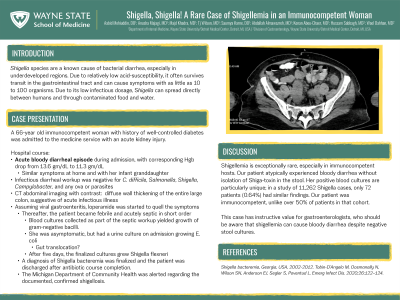Tuesday Poster Session
Category: Colon
P3776 - Shigella, Shigella! A Rare Case of Shigellemia in an Immunocompetent Woman
Tuesday, October 29, 2024
10:30 AM - 4:00 PM ET
Location: Exhibit Hall E

Has Audio

Aabid Mohiuddin, DO
Detroit Medical Center/Wayne State University
Detroit, MI
Presenting Author(s)
Aabid Mohiuddin, DO1, Anusha Majagi, MD1, Majd Khadra, MD1, TJ Wilson, MD2, Saumya L. Karne, DO1, Abdallah Almawazreh, MD1, Kenan Abou Chaer, MD1, Hussam Sabbagh, MD2, Wael Dahhan, MD3
1Detroit Medical Center/Wayne State University, Detroit, MI; 2Wayne State University School of Medicine / Detroit Medical Center, Detroit, MI; 3Wayne State University, Detroit, MI
Introduction: Shigella species are a known cause of bacterial diarrhea, especially in underdeveloped regions. Due to relatively low acid-susceptibility, it often survives transit in the gastrointestinal tract and can cause symptoms with as little as 10 to 100 organisms. Due to its low infectious dosage, Shigella can spread directly between humans and through contaminated food and water.
Case Description/Methods: A 66-year old immunocompetent woman with history of well-controlled diabetes was admitted to the medicine service with an acute kidney injury secondary to poor oral intake necessitating fluid resuscitation. During admission, the patient had acute, bloody diarrhea with a drop in hemoglobin from 13.6 gm/dL to 11.3 gm/dL. Further investigation revealed she had similar symptoms throughout the prior week, as did her young granddaughter.
An infectious diarrheal workup was negative for C. difficile, Salmonella, Shigella, Campylobacter, and any ova or parasites. Her past studies included a normal colonoscopy four years prior. Contrast computed tomography of the abdomen revealed diffuse wall thickening of the entire large colon, suggestive of acute infectious illness.
At this time, the leading suspicion was viral gastroenteritis and loperamide was initiated to quell the symptoms. Shortly after, the patient became febrile and then acutely septic in rapid succession. Blood cultures were initially positive for gram-negative bacilli; an assumption of gut translocation was made based on an asymptomatic urine culture growing E. coli, and Aztreonam was started based on susceptibilities. After five days, the finalized cultures instead grew Shigella flexneri. Treatment was unchanged, but final diagnosis was established as Shigella bacteremia. The patient was discharged home after completing the antibiotic course and achieving symptomatic improvement. In accordance to state guidelines, the Department of Health was alerted regarding the documented, confirmed shigellosis.
Discussion: Shigellemia is exceptionally rare, especially in immunocompetent hosts. Our patient atypically experienced bloody diarrhea without isolation of Shiga-toxin in the stool. Her positive blood cultures are particularly unique; in a study of 11,262 Shigella cases, only 72 patients (0.64%) had similar findings.3 Our patient was immunocompetent, unlike over 50% of patients in that cohort.
This case has instructive value for gastroenterologists, who should be aware that shigellemia can cause bloody diarrhea despite negative stool cultures.
Disclosures:
Aabid Mohiuddin, DO1, Anusha Majagi, MD1, Majd Khadra, MD1, TJ Wilson, MD2, Saumya L. Karne, DO1, Abdallah Almawazreh, MD1, Kenan Abou Chaer, MD1, Hussam Sabbagh, MD2, Wael Dahhan, MD3. P3776 - Shigella, Shigella! A Rare Case of Shigellemia in an Immunocompetent Woman, ACG 2024 Annual Scientific Meeting Abstracts. Philadelphia, PA: American College of Gastroenterology.
1Detroit Medical Center/Wayne State University, Detroit, MI; 2Wayne State University School of Medicine / Detroit Medical Center, Detroit, MI; 3Wayne State University, Detroit, MI
Introduction: Shigella species are a known cause of bacterial diarrhea, especially in underdeveloped regions. Due to relatively low acid-susceptibility, it often survives transit in the gastrointestinal tract and can cause symptoms with as little as 10 to 100 organisms. Due to its low infectious dosage, Shigella can spread directly between humans and through contaminated food and water.
Case Description/Methods: A 66-year old immunocompetent woman with history of well-controlled diabetes was admitted to the medicine service with an acute kidney injury secondary to poor oral intake necessitating fluid resuscitation. During admission, the patient had acute, bloody diarrhea with a drop in hemoglobin from 13.6 gm/dL to 11.3 gm/dL. Further investigation revealed she had similar symptoms throughout the prior week, as did her young granddaughter.
An infectious diarrheal workup was negative for C. difficile, Salmonella, Shigella, Campylobacter, and any ova or parasites. Her past studies included a normal colonoscopy four years prior. Contrast computed tomography of the abdomen revealed diffuse wall thickening of the entire large colon, suggestive of acute infectious illness.
At this time, the leading suspicion was viral gastroenteritis and loperamide was initiated to quell the symptoms. Shortly after, the patient became febrile and then acutely septic in rapid succession. Blood cultures were initially positive for gram-negative bacilli; an assumption of gut translocation was made based on an asymptomatic urine culture growing E. coli, and Aztreonam was started based on susceptibilities. After five days, the finalized cultures instead grew Shigella flexneri. Treatment was unchanged, but final diagnosis was established as Shigella bacteremia. The patient was discharged home after completing the antibiotic course and achieving symptomatic improvement. In accordance to state guidelines, the Department of Health was alerted regarding the documented, confirmed shigellosis.
Discussion: Shigellemia is exceptionally rare, especially in immunocompetent hosts. Our patient atypically experienced bloody diarrhea without isolation of Shiga-toxin in the stool. Her positive blood cultures are particularly unique; in a study of 11,262 Shigella cases, only 72 patients (0.64%) had similar findings.3 Our patient was immunocompetent, unlike over 50% of patients in that cohort.
This case has instructive value for gastroenterologists, who should be aware that shigellemia can cause bloody diarrhea despite negative stool cultures.
Disclosures:
Aabid Mohiuddin indicated no relevant financial relationships.
Anusha Majagi indicated no relevant financial relationships.
Majd Khadra indicated no relevant financial relationships.
TJ Wilson indicated no relevant financial relationships.
Saumya Karne indicated no relevant financial relationships.
Abdallah Almawazreh indicated no relevant financial relationships.
Kenan Abou Chaer indicated no relevant financial relationships.
Hussam Sabbagh indicated no relevant financial relationships.
Wael Dahhan indicated no relevant financial relationships.
Aabid Mohiuddin, DO1, Anusha Majagi, MD1, Majd Khadra, MD1, TJ Wilson, MD2, Saumya L. Karne, DO1, Abdallah Almawazreh, MD1, Kenan Abou Chaer, MD1, Hussam Sabbagh, MD2, Wael Dahhan, MD3. P3776 - Shigella, Shigella! A Rare Case of Shigellemia in an Immunocompetent Woman, ACG 2024 Annual Scientific Meeting Abstracts. Philadelphia, PA: American College of Gastroenterology.
